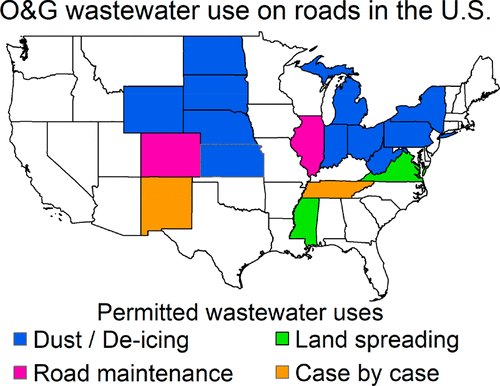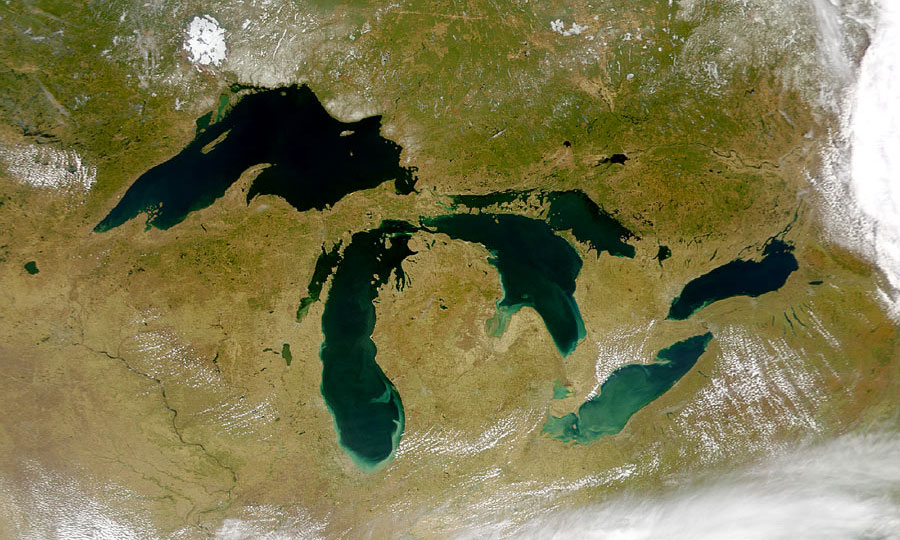Did you know that at least 13 states–including IL, IN, MI, NY, OH, & PA bordering the Great Lakes–allow wastewater from oil and gas extraction to be used in a variety of road maintenance applications? The high salt content of oil and gas well wastewaters makes them effective for use in deicing or retaining road moisture for the purposes of dust suppression. At first blush, this arrangement seems like a win-win, saving the well operators money in terms of wastewater treatment, and saving local government funding that might otherwise need to be spent on deicing and dust control fluids. The cost-effectiveness of this arrangement could be particularly important for rural communities with limited budgets.

However, a report published in a recent issue of Environmental Science and Technology highlights the potential environmental and human health ramifications of using oil and gas wastewater in this fashion. From the article’s abstract: “Analyses of O&G wastewaters spread on roads in the northeastern, U.S. show that these wastewaters have salt, radioactivity, and organic contaminant concentrations often many times above drinking water standards. Bioassays also indicated that these wastewaters contain organic micropollutants that affected signaling pathways consistent with xenobiotic metabolism and caused toxicity to aquatic organisms like Daphnia magna. The potential toxicity of these wastewaters is a concern as lab experiments demonstrated that nearly all of the metals from these wastewaters leach from roads after rain events, likely reaching ground and surface water. Release of a known carcinogen (e.g., radium) from roads treated with O&G wastewaters has been largely ignored. In Pennsylvania from 2008 to 2014, spreading O&G wastewater on roads released over 4 times more radium to the environment (320 millicuries) than O&G wastewater treatment facilities and 200 times more radium than spill events. Currently, state-by-state regulations do not require radium analyses prior to treating roads with O&G wastewaters. “
The researchers propose the following means to reduce potential harmful impacts from using oil and gas (O&G) wastewater for road treatment. Note that “DRO” stands for “diesel range organics” and “GRO” is “gas range organics” which is indicative of the total petroleum hydrocarbon present (see https://en.wikipedia.org/wiki/Total_petroleum_hydrocarbon for further information). “1) Only O&G wastewaters that have been treated at wastewater treatment facilities should be considered for road spreading. The high calcium, sodium, and magnesium concentrations in O&G wastewaters are important for suppressing dust. In addition to the high salt concentrations, these wastewaters contain lead, radium, and organic compounds that could be potentially toxic. Wastewater treatment facilities are not designed to remove the high salt concentrations in O&G wastewaters. However, they can effectively remove radium, oil and grease, and other trace metals. 2) O&G wastewaters approved for road spreading should contain <60 pCi/L radium and <10 mg/L of total DRO and GRO, similar to other industrial wastewater effluent standards. No induction to human cell receptors was observed at DRO and GRO concentrations below 10 mg/L. In most cases, the chemical composition of O&G wastewater intended for road spreading must be submitted and approved before use. However, requirements for these chemical characterizations are relatively modest, vary widely between states, and currently do not include radium. Having chemical standards for O&G wastewaters that can be spread on roads could help reduce the potential toxicity concerns associated with this practice. 3) Affordable nontoxic dust suppressants should be developed and used.”
In other words, they recommend development and use of cheaper, nontoxic alternatives for the benefit of communities with limited road maintenance budgets, and in instances where oil and gas wastewaters are used, those substances should be treated first to remove potentially toxic trace metals, as well as tested and confirmed as having levels of radium and petroleum hydrocarbon levels deemed safe based on industrial wastewater treatment standards.
Read the full article at https://pubs.acs.org/doi/10.1021/acs.est.8b00716.
Citation: T. L. Tasker, W. D. Burgos, P. Piotrowski, L. Castillo-Meza, T. A. Blewett, K. B. Ganow, A. Stallworth, P. L. M. Delompré, G. G. Goss, L. B. Fowler, J. P. Vanden Heuvel, F. Dorman, and N. R. Warner. 2018. Environmental and Human Health Impacts of Spreading Oil and Gas Wastewater on Roads. Environmental Science & Technology, 52 (12), pp. 7081-7091. DOI: 10.1021/acs.est.8b00716.
